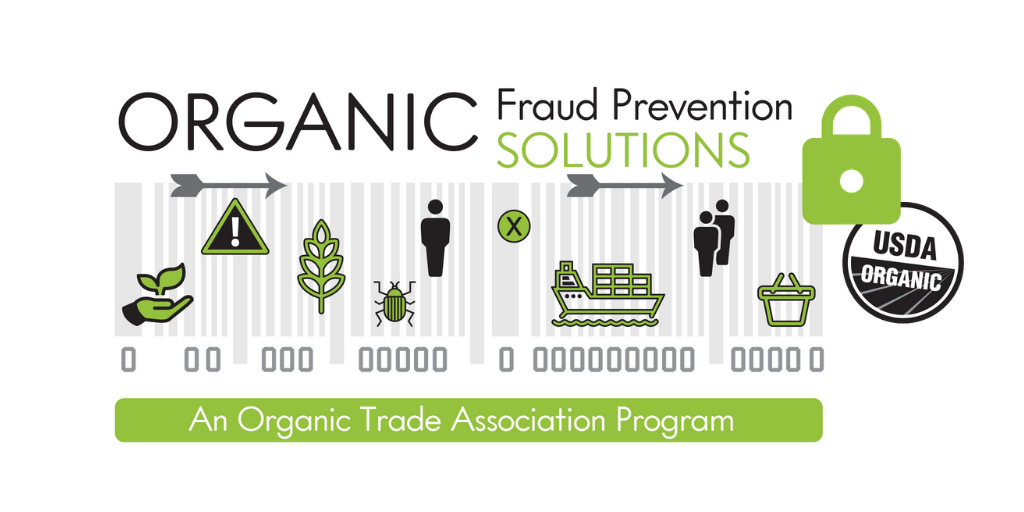Organic Trade Association teams up with USDA, Michigan State to combat fraud
In a significant enhancement to its arsenal of tools available to the organic sector to help fight fraud, the Organic Trade Association on Wednesday announced the development of three online training courses to bolster its Organic Fraud Prevention Solutions program.
The training courses have been designed for organic businesses, accredited certifiers and organic inspectors, with one of the courses a pre-requisite for businesses pre-enrolled in the program. The groundbreaking Organic Fraud Prevention Solutions program was launched by the Organic Trade Association earlier this year, and almost four dozen organic businesses have joined.
(Companies interested in enrolling in the program are encouraged to participate in the Organic Trade Association’s “Organic Fraud Prevention Solutions” webinar on Sept. 19, which will provide an update on the program. Register here.)
The new anti-fraud courses will analyze where opportunities for crime in the organic supply chain most commonly occur, and will educate on the key components of the Organic Fraud Prevention Plan and how to put it into real on-the-job practice. They will be built on the Organic Fraud Prevention Solutions program’s guide, which lays out a systematic process that businesses can implement to identify and minimize vulnerability to organic fraud.
“Anytime there is fraud anywhere in the organic system, it takes value out of the organic label,” said Gwendolyn Wyard, Vice President of Regulatory & Technical Affairs for the Organic Trade Association and staff coordinator for the association’s Global Organic Supply Chain Integrity Task Force. “Everyone plays a role in preventing organic fraud, and our members have been engaged and committed to helping the organic system better police itself. Our partnership with Michigan State University and the U.S. Department of Agriculture (USDA) in creating these new training sessions will strengthen our ability to protect against fraud and maintain the integrity of organic.”
The three online courses will be available in late 2019 and early 2020. All of the courses will be based on content in the Organic Trade Association’s Organic Fraud Prevention Guide and the food fraud prevention model developed by Michigan State University’s (MSU) Food Fraud Initiative*. MSU’s Food Fraud Initiative is an interdisciplinary research, education, and outreach organization that focuses on types of food fraud that can weaken and threaten our public health and economy.
One of the courses is tailored for organic operations pre-enrolled in the trade association’s fraud prevention program, and is offered through MSU’s Food Fraud Initiative and its Massive Open On-line Courses for Food Fraud (MOOC). The other two courses, designed for inspectors and certifiers, will be offered through USDA’s Organic Integrity Learning Center. All of the courses are free, and are online on-demand self-directed courses for self-paced learning.
Think like a criminal
Created by Michigan State in partnership with the Organic Trade Association, a comprehensive course designed as a pre-requisite for organic operations pre-enrolled in the Organic Trade Association’s Organic Fraud Prevention Solutions Program is five to seven hours in length. The course, “Developing and Implementing an Organic Fraud Prevention Plan,” will incorporate the two courses tailored for inspectors and certifiers, and, in addition, will provide detailed company-focused training on how to carry out a vulnerability assessment and how to develop and implement an organic fraud prevention plan.
“This partnership with the Organic Trade Association provides an accessible and comprehensive introduction to taking a rational approach to reducing the opportunity for fraud,” said Dr. John Spink, Director of the Food Fraud Initiative at Michigan State. “While there are a wide range of excellent tools and methods, to be really useful, they need to be refined and adapted to a specific problem. This series of training programs will raise the collective expertise and harmonize the approach to broadly reduce the opportunity for fraud.”
The two courses developed for organic inspectors and certifiers are made possible by a cooperative agreement between the Organic Trade Association and USDA, with the trade association working with Michigan State to develop the courses compatible with USDA’s Organic Integrity Learning Center. Both courses will be around five hours.
“The Organic Integrity Learning Center is an important free resource for organic certifiers, inspectors, and compliance professionals,” said Jennifer Tucker, Deputy Administrator of USDA’s National Organic Program, which oversees the Organic Integrity Learning Center. “More than 1,000 people have signed up for Learning Center accounts, and the Organic Trade Association’s courses will be an important resource for individuals across the organic industry who are fighting against fraud in the organic supply chain.”
One of the courses, “Organic Fraud and the Criminal Mind,” will provide insight into the criminal mind behind fraud, and how it takes advantage of weaknesses and gaps in the organic supply chain. It will break down common organic fraud vulnerabilities, and help enable inspectors and certifiers to better identify the opportunities for organic fraud.
The second course geared toward inspectors and certifiers is “Reviewing and Inspecting the Organic Fraud Prevention Plan.” It will detail the key elements and process for carrying out a vulnerability assessment, and help inspectors and certifiers to determine whether businesses have implemented adequate fraud-deterring measures through their Organic Fraud Prevention Plan.
Protecting the Organic seal and honoring the consumer trust
Protecting against fraud in the organic supply chain is a critical priority for the Organic Trade Association and its members. To help organic businesses have robust systems and measures in place to prevent and detect fraud, the Organic Trade Association has been leading the development of organic fraud prevention best practices for more than two years. Beginning with its member task force formed in 2017 to its rollout of its groundbreaking Organic Fraud Prevention Solutions program in March, the trade association has moved forcefully and proactively to confront the fraud challenge.
The Organic Fraud Prevention Solutions program requires training, an organic fraud vulnerability assessment and the development of an organic fraud prevention plan. After a company successfully registers with the Organic Trade Association with the implementation of the organic fraud prevention plan, the company will be considered “Organic Fraud Prevention Enrolled.”
Enrollment into the program signs the company up for the training course designed for organic operations. A pre-enrolled company completes the enrollment process and receives a certificate of completion once it has completed a nine-step process. Confirmation from the company’s certifier that their Organic System Plan is updated with an Organic Fraud Prevention Plan is the final step to enrollment completion.
“We are thrilled with the enthusiasm that our members have shown for this program, and we applaud the companies who have already signed up. But we encourage more companies to pre-enroll. The more companies that join this effort, the stronger the organic supply chain will be,” said Wyard.
For more information on the program and to pre-enroll, visit OTA.com.
The Organic Trade Association (OTA) is the membership-based business association for organic agriculture and products in North America. OTA is the leading voice for the organic trade in the United States, representing over 9,500 organic businesses across 50 states. Its members include growers, shippers, processors, certifiers, farmers' associations, distributors, importers, exporters, consultants, retailers and others. OTA’s Board of Directors is democratically elected by its members. OTA's mission is to promote and protect ORGANIC with a unifying voice that serves and engages its diverse members from farm to marketplace.
* MSU’s Food Fraud Initiative is an interdisciplinary research, education, and outreach organization. It focuses on all types of fraud that can contribute to public health and economic vulnerabilities and threats. These include adulteration, misbranding, tampering, overruns or licensee fraud, theft, diversion, simulation, and counterfeiting. Its work is accomplished through a collaboration between stakeholders from across industry, agencies, associations and other academics. Through the support of public-private partnerships, its mission is to reduce the extremely interdisciplinary and complex food supply chain vulnerability. For more, see www.FoodFraudPrevention.com and www.FoodFraudMOOC.com











